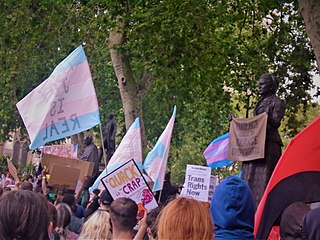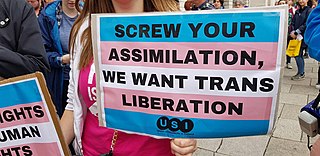The Gender Recognition Act 2004 is a law in the United Kingdom.
Gender Recognition Act may also refer to:
- Gender Recognition Act (Norway), a 2016 law
- Gender Recognition Act 2015, a law in Ireland
The Gender Recognition Act 2004 is a law in the United Kingdom.
Gender Recognition Act may also refer to:
The legal status of transgender people varies greatly around the world. Some countries have enacted laws protecting the rights of transgender individuals, but others have criminalized their gender identity or expression. In many cases, transgender individuals face discrimination in employment, housing, healthcare, and other areas of life.

The Scotland Act 1998 is an Act of the Parliament of the United Kingdom which legislated for the establishment of the devolved Scottish Parliament with tax varying powers and the Scottish Government. It was one of the most significant constitutional pieces of legislation to be passed by the UK Parliament between the passing of the European Communities Act in 1972 and the European Union (Withdrawal) Act in 2018 and is the most significant piece of legislation to affect Scotland since the Acts of Union in 1707 which ratified the Treaty of Union and led to the disbandment of the Parliament of Scotland.

The Gender Recognition Act 2004 is an act of the Parliament of the United Kingdom that allows adults in the United Kingdom who have gender dysphoria to change their legal gender. It came into effect on 4 April 2005.

Rights affecting lesbian, gay, bisexual, transgender and queer (LGBTQ) people vary greatly by country or jurisdiction—encompassing everything from the legal recognition of same-sex marriage to the death penalty for homosexuality.

Stephen Thomas Whittle is a British legal scholar and activist with the transgender activist group Press for Change. Since 2007, he has been Professor of Equalities Law in the School of Law at Manchester Metropolitan University. Between 2007 and 2009, he was president of the World Professional Association for Transgender Health (WPATH). Having been assigned female at birth, he is described as "a radical lesbian before his sex change and now a leading commentator on gender issues", who after the Gender Recognition Act 2004 came into force in April 2005, achieved legal recognition as a man and so was able to marry his female partner.

The rights of lesbian, gay, bisexual, transgender, and queer (LGBTQ) people in the United Kingdom have developed significantly over time. Today, lesbian, gay and bisexual rights are considered to be advanced by international standards, while transgender, gender-nonconforming and non-binary people face some of the highest levels of discrimination of any modernised country.
GRA or Gra may refer to:

Lesbian, gay, bisexual, transgender and queer (LGBTQ) rights in Scotland are generally in line with the rest of the United Kingdom, which have evolved extensively over time and are now regarded as some of the most progressive in Europe. In both 2015 and 2016, Scotland was recognised as the "best country in Europe for LGBTI legal equality".

Lydia Annice Foy is an Irish trans woman notable for leading legal challenges regarding gender recognition in Ireland. In 1992, Foy had sex reassignment surgery, and began a 20-year battle to have her birth certificate reflect her gender identity. In 2007, the Irish High Court ruled that the relevant portions of the law of the Republic of Ireland were incompatible with the European Convention on Human Rights, but by February 2013 the law had not been changed and she began new legal proceedings to enforce the 2007 decision. As of 15 July 2015, Ireland has passed the Gender Recognition Bill 2014.

Lesbian, gay, bisexual, and transgender (LGBT) people in the British Overseas Territory of the Falkland Islands enjoy most of the same rights as non-LGBT people. Marriage and civil partnerships have been open to both opposite-sex and same-sex couples since 29 April 2017. Discrimination on the basis of sexual orientation is constitutionally banned. Additionally, attitudes are largely positive; a public consultation found that 90% of respondents were in favour of same-sex marriage.

Helena Dalli is a Maltese politician serving as European Commissioner for Equality since 1 December 2019. She is a member of the Labour Party.

Intersex people are born with sex characteristics, such as chromosomes, gonads, or genitals, that, according to the UN Office of the High Commissioner for Human Rights, "do not fit typical binary notions of male or female bodies."

Intersex people are born with sex characteristics, such as chromosomes, gonads, or genitals that, according to the United Nations Office of the High Commissioner for Human Rights, "do not fit typical binary notions of male or female bodies".

Intersex people are born with sex characteristics, such as chromosomes, gonads, or genitals that, according to the UN Office of the High Commissioner for Human Rights, "do not fit typical binary notions of male or female bodies". "Because their bodies are seen as different, intersex children and adults are often stigmatized and subjected to multiple human rights violations".
Transgender rights in Australia have legal protection under federal and state/territory laws, but the requirements for gender recognition vary depending on the jurisdiction. For example, birth certificates, recognised details certificates, and driver licences are regulated by the states and territories, while Medicare and passports are matters for the Commonwealth.

Multiple countries legally recognize non-binary or third gender classifications. These classifications are typically based on a person's gender identity. In some countries, such classifications may only be available to intersex people, born with sex characteristics that "do not fit the typical definitions for male or female bodies."

Transgender rights in the United Kingdom have varied significantly over time.

A citizen of Ireland is legally permitted to change the designation of their gender on government documents through self-determination. In 2015, Ireland was the fourth state in the world to permit such alterations to government documents. By May 2017, 230 people had been granted gender recognition certificates under the law. Section 16 of the Act entitles the holder of a gender recognition certificate to apply to have the certificate amended if there is a clerical error or an error of fact in the content of the certificate. Two such corrections have been made since commencement of the Act.

Gender self-identification or gender self-determination is the concept that a person's legal sex or gender is determined by their gender identity, without medical or judicial requirements.

The Gender Recognition Reform (Scotland) Bill is a bill passed by the Scottish Parliament. The bill seeks to amend the Gender Recognition Act 2004 of the Parliament of the United Kingdom, making it simpler for people to change their legal gender. On 17 January 2023, the United Kingdom government used section 35 of the Scotland Act 1998 to block the bill from receiving royal assent, the first time section 35 has been used.